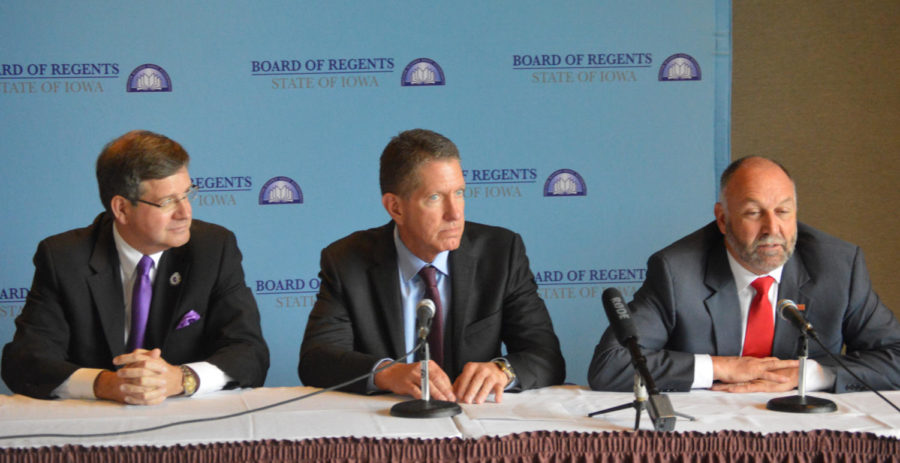Tuition freeze may end in January
Matthew Rezab/Iowa State Daily
From left, UNI President Bill Ruud, Board of Regents President Bruce Rastetter and ISU President Steven Leath take questions from the media in the Scheman Building during the Board of Regents meeting on June 4.
June 4, 2015
Board of Regents President Bruce Rastetter says tuition at Iowa’s regent universities will stay frozen this fall for resident undergraduates, but may rise when the spring semester begins in January.
Because of education funding compromises, the University of Iowa, Iowa State University and the University of Northern Iowa will receive a one-time 1.25 percent increase in funding. The one-time funding must be used for nonrecurring expenses. The regents originally asked for a 1.75 percent increase to cover the cost of the tuition freeze.
The 1.25 percent increase represents approximately $2.9 million for the U of I, $2.3 million for ISU and $1.1 million for UNI.
At the December 2014 meeting, the Board of Regents unanimously approved a recommendation to the state legislature to freeze tuition for a third consecutive year, but because funding levels are lower than expected, the possiblity of a tuition hike in January has been placed on the table.
Rastetter said he recommended continuing the freeze for the fall semester because students and parents need visibility and certainty on what the cost of their education will be.
Rastetter said legislators have an agreement for an additional $1.1 million for Iowa State and $5.1 million more for UNI, but things could change because some details are still being worked out and the governor still has line-item veto authority.
“I think it’s reflective of the discussion that we had,” Rastetter said. “With 20,000 in-state students, Iowa State needs to have some additional dollars added to its base.”
Rastetter said no decisions would be made about a tuition increase until the final funding numbers were in, and board members had a chance to collaborate with each university in order to come to a decision. He expects a decision by the October meeting.
State Sen. Herman Quirmbach, D-Ames, said his two priorities during the budget process have been the tuition freeze and allocating more money to Iowa State.
“We’re slicing it too thin,” Quirmbach said. “It’s the dollars we deliver that is going to make the difference.”
The legislature also declined to implement the performance-based funding model approved by the regents last summer. If adopted, performance-based funding would have allocated more money to schools based on the number of in-state undergraduates enrolled, along with student progress, access for low income and minorities, sponsored research and graduate and professional students.
Iowa State has the most in-state students and more than 90 percent of UNI students are from Iowa. The University of Iowa has about 17,000 resident students.
ISU President Steven Leath said uniformed and untrue reports in the media hurt the new funding model’s reputation.
“It created a bias in the legislature, a bias in the general public as to the implications of performance-based funding, like there was going to be some unintended consequence in the form of competition,” Leath said.
Leath also said he has turned down every proposal to increase recruitment funding at Iowa State, crediting the culture and programs at Iowa State for the growth in enrollment.
Rastetter said the board will have to take up funding proposals for the 2016-17 academic year in September or October, and performance-based funding would need to be approved by the regents again.
“If we think about 70 years of the present budget, it may not surprise anyone that it may take more than a year to have [performance-based funding] instituted in the budget,” Rastetter said. “We’re disappointed, we’re not surprised that it’s going to take longer.”
Note: Shannon McCarty contributed to this article.







